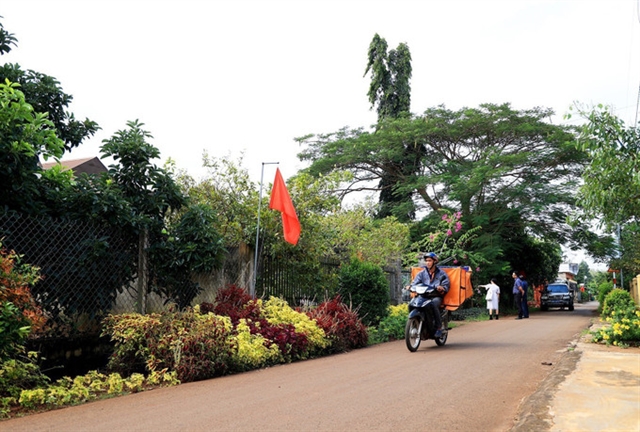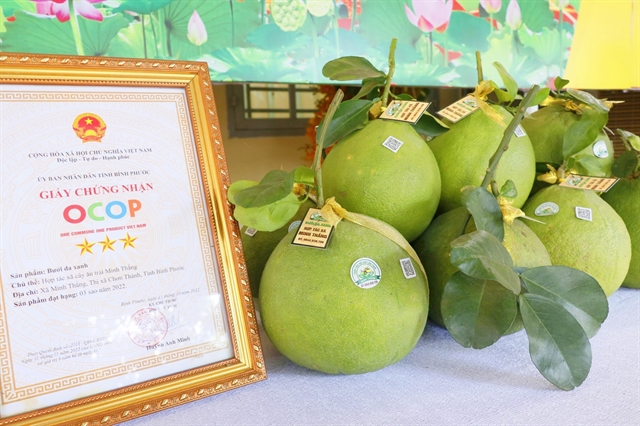 Society
Society

 |
| Xuân Định Commune has been recognised as an exemplary new-style rural commune in Đồng Nai Province. – VNA/VNS Photo Hồng Đạt |
ĐỒNG NAI – Đồng Nai Province is harnessing its strengths in eco-tourism and agriculture to build new-style rural areas, aiming to improve livelihoods and create greener living environments.
The southeastern province stands out with national park ecotourism, pristine lakes and waterfalls, fruit orchards, and distinctive ethnic cultural heritage.
It has two national parks – Cát Tiên and Bù Gia Mập.
In Bom Bo Commune, the local authority is planning tourism linked with preserving the cultural values of the S’tiêng ethnic minority, and investing in infrastructure, especially the road to the Bom Bo Hamlet heritage site.
Vũ Long Sơn, secretary of the commune Party Committee, said that to further develop new-style rural areas, the commune is integrating rural tourism in line with the overall rural development plan.
It will develop community tourism, homestays, cultural and festival experiences, cuisine, and traditional crafts connected with agriculture, he said.
Phạm Anh Tuấn, director of the Bom Bo Commune General Services Centre, said the country’s programme of building new-style rural areas has played an active role in supporting the development of rural tourism through upgrading infrastructure, environmental sanitation, and cultural and craft village preservation.
In return, rural tourism contributes to improving the quality of building new-style rural areas through income growth, creating livelihoods, and increasing the consumption of specialty products, he said.
The commune plans to turn the S'tieng Ethnic Culture Preservation Area in Bom Bo Hamlet into a unique tourism highlight, he said.
In Bù Gia Mập Commune, where ethnic minorities account for 75 per cent of the population, the lives of many residents remain difficult.
It is one of the province’s few communes that has not been recognised as a new-style rural commune.
In building new-style rural areas, it will use its strength in forest resources and Bù Gia Mập National Park to develop eco-tourism.
Lê Hoàng Nam, secretary of the Bù Gia Mập Commune Party Committee, said tourism and services are identified as breakthrough economic sectors.
The commune will focus on developing ecological, community, and agricultural tourism in combination with products recognised under the country’s “One Commune – One Product” (OCOP) programme and border area advantages.
It will create favourable conditions to attract investment in tourism sites that have large scale, high quality, and diversified and specific tourism products, he said.
After the merger of the former Bình Phước Province into Đồng Nai on July 1, the enlarged Đồng Nai has 72 rural communes.
Of these, 67 have been recognised as new-style rural communes, which meet the 19 criteria of the new-style rural area programme that are related to infrastructure, irrigation, electricity, environment, income, education, healthcare, social security, culture, and others.
Twenty-five communes have been recognised as advanced new-style rural communes, and eight as exemplary new-style rural communes.
A new-style rural commune is upgraded to advanced, and later exemplary, once it meets higher standards in all 19 criteria.
Nguyễn Văn Thắng, deputy director of the provincial Department of Agriculture and Environment, said this result reflects many years of investment in infrastructure.
The province’s income, culture, environment and production organisation criteria all reached high levels, he said.
Nguyễn Thị Hoàng, deputy chairwoman of the provincial People’s Committee, said: “Today, the appearance of the province’s rural areas has changed greatly. Infrastructure has been invested in, and people’s lives have improved.”
The province aims for 90 per cent of its communes to be recognised as new-style rural communes by 2030, she said.
By then, at least 50 per cent are expected to meet advanced standards, and 10 per cent to develop into modern new-style rural communes, she added.
The model of modern new-style rural communes will replace the exemplary commune model, upgrading all criteria with a focus on clean, organic, and high-tech agriculture, together with digital transformation. The goal is to improve livelihoods and create safe, green living environments.
Many advanced and exemplary new-style rural communes now reach average incomes of more than VNĐ90 million (US$3,400) per person per year, with some exceeding VNĐ100 million ($3,800).
The province is expanding the OCOP programme, and now has 298 OCOP products, including 50 four-star and eight five-star products, as of the middle of this year.
It has built 299 value chain linkages, connecting 117 businesses, 64 co-operatives, and nearly 15,000 households, accounting for over 51 per cent of its agricultural, forestry, and fishery output value.
 |
| The green-skin and pink-flesh grapefruits of the Minh Thắng Fruit Co-operative in Đồng Nai Province’s Nha Bí Commune have been certified as a three-star product under the country’s “One Commune – One Product” (OCOP) programme. – VNA/VNS Photo Nhật Bình |
Developing agriculture
Đồng Nai has more than one million hectares of farmland, a strong foundation for developing large-scale raw material areas.
It has developed 560 production–consumption linkages, ensuring stable outlets and higher incomes for farmers.
The Nông Văn Cảnh durian co-operative group in Phú Trung Commune is a typical model of linkage development.
It has 16 members, mostly from ethnic minorities, linking tightly from inputs to production and consumption.
Thanks to a farm contract with Truong Thinh Phat Trading Investment Company Limited in Nghĩa Trung Commune, its durian and avocado products have stable markets and are exported to several markets, including China.
Last year, the group sold 230 tonnes of durian worth VNĐ18.4 billion ($700,000) and 80 tonnes of avocado worth VNĐ1.2 billion ($45,500).
Nông Văn Cảnh, head of the co-operative group, said since joining the co-operative group, the members have changed their approach to production, improved their lives, and strengthened community bonds.
The Trảng Cỏ Bù Lạch Organic Cashew Co-operative in Thọ Sơn Commune, with over 200 members, including 120 from ethnic minorities, has also helped many households escape poverty.
Điểu Nu, a co-operative member, said: “In the past, purchase prices were unstable. Now, with a farm contract, prices increase by VNĐ500–1,000 per kilogramme. Farmers also receive money, fertiliser support and guidance on new varieties.”
Thị Khưi, the co-operative’s director, said organic production ensures stable markets, prevents price suppression, generates profit and improves member’s lives.
Thắng, deputy director of the Department of Agriculture and Environment, said climate change, epidemics and rising production costs are major challenges.
The province is therefore restructuring agriculture towards sustainability, linked to processing industries and exports, he said. – VNS




